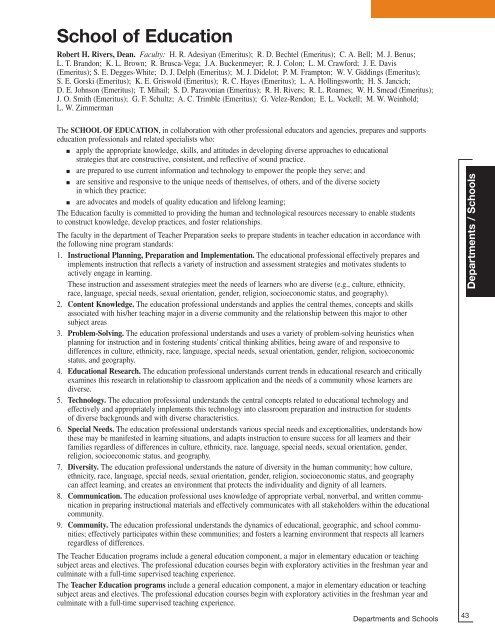ACADEMIC CATALOG - Purdue University Calumet
ACADEMIC CATALOG - Purdue University Calumet
ACADEMIC CATALOG - Purdue University Calumet
Create successful ePaper yourself
Turn your PDF publications into a flip-book with our unique Google optimized e-Paper software.
School of Education<br />
Robert H. Rivers, Dean. Faculty: H. R. Adesiyan (Emeritus); R. D. Bechtel (Emeritus); C. A. Bell; M. J. Benus;<br />
L. T. Brandon; K. L. Brown; R. Brusca-Vega; J.A. Buckenmeyer; R. J. Colon; L. M. Crawford; J. E. Davis<br />
(Emeritus); S. E. Degges-White; D. J. Delph (Emeritus); M. J. Didelot; P. M. Frampton; W. V. Giddings (Emeritus);<br />
S. E. Gorski (Emeritus); K. E. Griswold (Emeritus); R. C. Hayes (Emeritus); L. A. Hollingsworth; H. S. Jancich;<br />
D. E. Johnson (Emeritus); T. Mihail; S. D. Paravonian (Emeritus); R. H. Rivers; R. L. Roames; W. H. Smead (Emeritus);<br />
J. O. Smith (Emeritus); G. F. Schultz; A. C. Trimble (Emeritus); G. Velez-Rendon; E. L. Vockell; M. W. Weinhold;<br />
L. W. Zimmerman<br />
The SCHOOL OF EDUCATION, in collaboration with other professional educators and agencies, prepares and supports<br />
education professionals and related specialists who:<br />
apply the appropriate knowledge, skills, and attitudes in developing diverse approaches to educational<br />
strategies that are constructive, consistent, and reflective of sound practice.<br />
are prepared to use current information and technology to empower the people they serve; and<br />
are sensitive and responsive to the unique needs of themselves, of others, and of the diverse society<br />
in which they practice;<br />
are advocates and models of quality education and lifelong learning;<br />
The Education faculty is committed to providing the human and technological resources necessary to enable students<br />
to construct knowledge, develop practices, and foster relationships.<br />
The faculty in the department of Teacher Preparation seeks to prepare students in teacher education in accordance with<br />
the following nine program standards:<br />
1. Instructional Planning, Preparation and Implementation. The educational professional effectively prepares and<br />
implements instruction that reflects a variety of instruction and assessment strategies and motivates students to<br />
actively engage in learning.<br />
These instruction and assessment strategies meet the needs of learners who are diverse (e.g., culture, ethnicity,<br />
race, language, special needs, sexual orientation, gender, religion, socioeconomic status, and geography).<br />
2. Content Knowledge. The education professional understands and applies the central themes, concepts and skills<br />
associated with his/her teaching major in a diverse community and the relationship between this major to other<br />
subject areas<br />
3. Problem-Solving. The education professional understands and uses a variety of problem-solving heuristics when<br />
planning for instruction and in fostering students' critical thinking abilities, being aware of and responsive to<br />
differences in culture, ethnicity, race, language, special needs, sexual orientation, gender, religion, socioeconomic<br />
status, and geography.<br />
4. Educational Research. The education professional understands current trends in educational research and critically<br />
examines this research in relationship to classroom application and the needs of a community whose learners are<br />
diverse.<br />
5. Technology. The education professional understands the central concepts related to educational technology and<br />
effectively and appropriately implements this technology into classroom preparation and instruction for students<br />
of diverse backgrounds and with diverse characteristics.<br />
6. Special Needs. The education professional understands various special needs and exceptionalities, understands how<br />
these may be manifested in learning situations, and adapts instruction to ensure success for all learners and their<br />
families regardless of differences in culture, ethnicity, race. language, special needs, sexual orientation, gender,<br />
religion, socioeconomic status, and geography.<br />
7. Diversity. The education professional understands the nature of diversity in the human community; how culture,<br />
ethnicity, race, language, special needs, sexual orientation, gender, religion, socioeconomic status, and geography<br />
can affect learning, and creates an environment that protects the individuality and dignity of all learners.<br />
8. Communication. The education professional uses knowledge of appropriate verbal, nonverbal, and written communication<br />
in preparing instructional materials and effectively communicates with all stakeholders within the educational<br />
community.<br />
9. Community. The education professional understands the dynamics of educational, geographic, and school communities;<br />
effectively participates within these communities; and fosters a learning environment that respects all learners<br />
regardless of differences.<br />
The Teacher Education programs include a general education component, a major in elementary education or teaching<br />
subject areas and electives. The professional education courses begin with exploratory activities in the freshman year and<br />
culminate with a full-time supervised teaching experience.<br />
The Teacher Education programs include a general education component, a major in elementary education or teaching<br />
subject areas and electives. The professional education courses begin with exploratory activities in the freshman year and<br />
culminate with a full-time supervised teaching experience.<br />
Departments and Schools<br />
Departments / Schools<br />
43

















